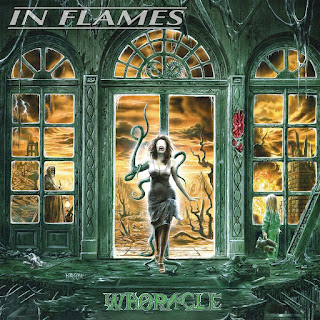In Flames - "Whoracle" (1997)

Nowe, przeważnie uproszczone logo to pierwszy z poważnych sygnałów, który związany jest z wymiękaniem czy ogólną zdradą ideałów. Cóż, w przypadku "Whoracle" średnio taka teoria trzyma się kupy (słowo-klucz), ponieważ...ci panowie niemal od zawsze byli daleko od słownikowego pojęcia ekstremalnego grania! Ba, z perspektywy "The Jester Race", bardzo szybko można dojść do wniosku (bo już po otwieraczu), że Szwedzi na swoim trzecim albumie nie odeszli zbyt daleko od poprzedniego stylu. Właściwie, rozszerzyli go o dość standardowe (zwłaszcza w późniejszym czasie) elementy dla tego gatunku, tj. o większą melodyjność i przebojowość. Wobec samego In Flames oczywiście zmiany te przełożyły się na następny wielki sukces komercyjny. Ja sam, od "Whoracle" za to zacząłem być bardziej czepliwy co do ich dorobku - co i tak dla niektórych będzie zdziwieniem, że dopiero teraz.
Jak wspominałem, muzyka na kurwoczni nie odstaje aż tak mocno od tej z "The Jester Race", choć pod paroma względami wydaje się być nieco przedobrzoną. To co ją odróżnia od poprzednich dwóch płyt tyczy się przede wszystkim mniej chropowatego soundu gitar, delikatnego rozbudowania wokali (o dwugłosy i niższe, mówione) oraz większej ilości skandynawskiej (na szczęście, w oparciu o tradycyjne, metalowe instrumentarium) i heavy metalowej melodyki. Raptem tyle, choć pomimo tej skromności, dość rozmiękczająco i z przewagą duuużo lżejszych klimatów. No i tak, melodie czy heavy metalowe patataje same w sobie nie są tu złe, problem polega jednak na tym, że jest ich na "Whoracle" stanowczo zbyt wiele. Po prostu, niemal całkowicie zanikł u In Flames kontrast między cięższą a melodyjniejszą stroną.
Najważniejszym wówczas dla In Flames było granie chwytliwe, melodyjne i - najprościej rzecz ujmując - piosenkowe. Pod tym względem "Whoracle" oferuje sporo ładnych kawałków pokroju "The Hive", niby-symfonicznego "Worlds Within The Margin", odjazdowego, ale mocno akustycznego "Jester Script Transfigured" oraz dość szybkich jak na nich "Morphing Into Primal" czy "Food For The Gods". Na minus, na pewno długość krążka i - co się za tym wiąże - sporo męczenia pod koniec (szczególnie w tytułowcu i coverze Depeche Mode "Everything Counts") oraz wspomniana kilkukrotnie jeszcze większa ilość łagodzenia. Bez tych elementów (lub lepiej je wyważając) trzeci krążek kapeli Jespera Strömblada mógłby wywoływać znacznie ciekawsze odczucia.
W "Whoracle" dostrzegam zatem początek końca In Flames. Wraz z jego ukazaniem się, najdobitniej bowiem stało się widocznym jak dla Szwedów ważny jest nacisk na melodie i pozyskiwanie coraz to mniej wymagających słuchaczy. Na początku (tj. odtąd aż do "Clayman") jeszcze trzymali fason, aczkolwiek nie na tyle, by w pełni polubić ten kierunek.
Ocena: 6/10
[English version]
The new, mostly simplified logo is the first of the serious signals associated with softening or general betrayal of ideals. Well, in the case of "Whoracle" such a theory holds up because...these gentlemen have almost always been far from the dictionary concept of extreme metal! From the perspective of "The Jester Race", you can quickly come to the conclusion (after the first track) that the Swedes on their third album did not go too far from the previous style. Actually, they extended it with quite standard (especially later) elements for this genre, i.e. more melodiousness and hitness. In view of In Flames itself, of course, these changes came into another great commercial success. I myself, from "Whoracle", started to be more clingy about their cds - which for some people will be a surprise that from now.
As I mentioned, the music on the "Whoracle" does not stand out so much from that from "The Jester Race", although in some respects it seems to be a bit overdone. What distinguishes it from the previous two albums is mainly the less rough sound of guitars, a delicate expansion of the vocals (with two voice tracks and lower, spoken) and more Scandinavian (fortunately, based on traditional metal instruments) and heavy metal melodies. Only this, although despite this modesty, but quite softening and with a predominance of much lighter climates. And yes, melodies or heavy metal rhythms are not bad to themselves, but the problem is that there are far too many of them on "Whoracle". To put it simply, the contrast between the heavier and more melodious sides of In Flames has almost completely disappeared here. Something that was much less of an issue before.
The most important for In Flames at that time was to create catchy, melodic and undemanding songs. In this respect, "Whoracle" offers a lot of pretty tracks like "The Hive", quasi-symphonic "Worlds Within The Margin", cool but acoustic "Jester Script Transfigured" and quite fast for them "Morphing Into Primal" or "Food For The Gods". On the downside, certainly the length of the disc and - which is related to it - a lot of fatigue at the end (especially in the title track and cover of Depeche Mode "Everything Counts") and the aforementioned several times melodiousness. Without these elements (or better balancing them), the third album by Jesper Strömblad's band could have evoked much more interesting feelings.
So in "Whoracle" I see the beginning of the end of In Flames. With its release, it has become most clearly visible, as for Swedes, the emphasis on melodies and attracting less and less demanding listeners are the most important. At the beginning (i.e. until "Clayman") they still kept the style, but not enough to fully like this direction.
Rating: 6/10



Komentarze
Prześlij komentarz